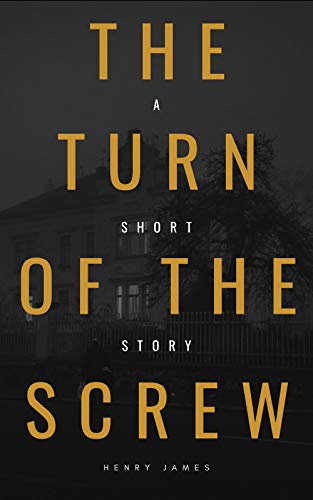The Turn of the Screw (American Classics Edition) (Annotated)
Henry James
BOOK REVIEW

Most people think they understand horror; they think it requires monsters lurking beneath beds or ghosts rattling chains in dark hallways. But true fear is found in the subtleties, in what is not said-like in Henry James's The Turn of the Screw. This novel does not merely whisper ghost stories; it screams questions about sanity, innocence, and the moral fabric of society itself.
Set in an isolated English estate, the narrative follows a governess who is hired to care for two orphaned children, Flora and Miles. As she becomes ensnared in the perceived innocence of her charges, she gradually spirals into a labyrinth of unsettling encounters, culminating in spine-chilling revelations that blur the lines between reality and imagination. Is she merely witnessing apparitions, or is her mind playing cruel tricks? This central conundrum thrusts you from a cozy reading nook into a realm where every creak of the floorboards reverberates like a death knell.
Through elegantly crafted prose, James paints a portrait of suspense that grips the reader with relentless intensity. You'll find yourself turning pages not out of mere curiosity, but because your very essence is drawn into an existential quagmire. The nuanced complexity of the governess's psychological state is what makes this work feel so profoundly unsettling. Is she a heroine defending the children from malevolent spirits, or an unreliable narrator unraveling before our eyes? Critics have fiercely debated this for over a century, highlighting the novel's enduring ability to provoke thought.
Many readers have found that The Turn of the Screw, with its layered ambiguities and psychological depth, transcends the simple ghost story, transforming into a fertile ground for deeper discussions about sexuality, power dynamics, and the loss of innocence. The governess herself is a character steeped in complexities; her motivations oscillate between maternal affection and obsessive paranoia, leaving readers divided. Some laud her fierce protectiveness, while others see her as a harbinger of doom, questioning her very sanity as the lines between love and control blur.
The novel's chilling atmosphere serves as a mirror reflecting our anxieties about trust and vulnerability. The children, ostensibly pure, become symbols of the fragile nature of innocence. Are they truly victims, or are they complicit in a dark force? As you wade through James's exquisite prose, you'll find your emotions swinging like a pendulum, caught between dread and fascination.
Curiously, it's hard to escape the overarching theme of societal decay present in the backdrop of the Victorian era-its rigid moral codes and the undercurrents of repressed desires. James deftly navigates this tension, creating a palpable sense of unease. You'll realize that the horror does not merely arise from spectral figures but from the haunting implications of societal expectations and personal turmoil.
Readers have offered a wild array of opinions; some argue that James's ambiguity is a masterpiece, while others feel frustrated by the lack of clear answers. Yet therein lies the beauty: the discomfort is exactly what makes this story powerful. It forces a confrontation with our fears, not just of the supernatural but of ourselves. Are we flawed with interpretations that border on madness, or can we dare to believe in the supernatural quests beyond our comprehension?
In essence, The Turn of the Screw is not merely a tale of ghostly pursuits but an exploration of our darkest instincts and the complexities of human nature. It celebrates the act of questioning, leaving you haunted long after you've turned the last page. What do you truly believe? Are you ready to face the shadows lurking in your own psyche?
James's influence is undeniable-directly inspiring authors like Henry Miller and Joseph Conrad, both of whom grappled with complex narratives that question the human condition. The chilling, ambiguous nature of his work echoes through the corridors of literature, reminding us that sometimes the real horror lies not in the external, but in the internal.
Dare to confront your deepest fears, and let The Turn of the Screw pull you into a world where sanity teeters on a knife's edge. This is not just a story to be read; it's an experience that demands to be felt. Will you take the plunge into its depths?
📖 The Turn of the Screw (American Classics Edition) (Annotated)
✍ by Henry James
🧾 114 pages
2020
#turn #screw #american #classics #edition #annotated #henry #james #HenryJames